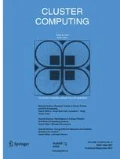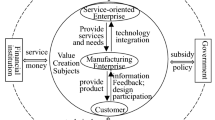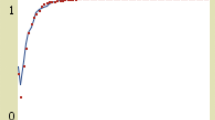Abstract
The outsourcing of manufacturing enterprises can effectively enhance core competitiveness and respond to market quickly with the help of third-party logistics enterprises. Based on the theory of evolutionary game theory, this paper establishes the payment matrix of logistics outsourcing cooperation between manufacturing enterprises and third-party logistics enterprises, and then makes dynamic analysis of outsourcing to obtain the evolutionary stability strategy. Using multi-agent establishes simulation model on NetLogo simulation platform and combining reality of reality into the numerical simulation analysis. Combination of theory and Practice analyze logistics outsourcing of manufacturing enterprise. Finally, according to the model simulation results, manufacturing enterprises and third-party logistics enterprises are proposed to improve measures to promote the joint development of manufacturing enterprises and third-party logistics enterprises.






Similar content being viewed by others
References
Liu, J.: China, Lian water Chinese manufacturing industry: current, challenges and trends. Science 4, 15–21 (2015)
Chu, M.: Imbalance of manufacturing structure and loss of total factor productivity: empirical analysis based on the data of industrial enterprises in China. Soft Sci. 31(81), 13–18 (2017)
Işıklar, G., Alptekin, E., Büyüközkan, G.: Application of a hybrid intelligent decision support model in logistics outsourcing. Comput. Oper. Res. 34(12), 3701–3714 (2007)
Li, T.: Analysis of enterprise logistics outsourcing decision. Coop. Econ. Technol. 22(11), 118–120 (2016)
Guangdong-coated strict Gu angle manufacturing companies choose TPL cooperation incentives game analysis. Technol. Manag. 17, 70–74 (2015)
Chang, K.: Research on logistics outsourcing decision of enterprise. Enterp. Strateg. 10, 16–19 (2016)
Xiangli. Risk evaluation and control of enterprise logistics outsourcing—based on AHP fuzzy comprehensive evaluation method. Enterp. Econ. 72–75 (2015)
Zhao. B.: Contract Research. Fourth Incentive-Based Outsourcing Gradient Effect. Hebei Province, Yanshan University, 2015
Yan, Y.: Logistics outsourcing decision model and simulation analysis of small and medium enterprises based on system dynamics. Technol. Method 35(5), 365–368 (2012)
Xu, G.: Decision model and simulation analysis of enterprise logistics outsourcing based on system dynamics. Hunan University, Hunan (2007)
Zhao, Y., Guo, Y.: Classification and value creation of service derivatives in manufacturing enterprises. Soft Sci. 31(7), 103–107 (2017)
Maraseo, A.: Third-party logistics: a literature review. Int. J. Prod. Econ. 113(1), 127–147 (2014)
Alp, O., Erkip, K.N.K., Gullu, R.: Outsourcing logistics: designing transportation contracts between a manufacturer and a transporter. Transp. Sci. 37(1), 23–39 (2013)
Yang, L., Qian, L.: Cooperation based on asymmetric information between manufacturing enterprises and third-party service providers game analysis. Logist. Technol. 33(11), 232–235 (2014)
Xiao, Z.: GuChunlong research under asymmetric information logistics outsourcing incentive model. Zhongnan Univ. Technol. 5, 130–135 (2013)
Yiqun, D., Yang, L.: Game analysis of manufacturing enterprises and third party service providers based on asymmetric information. Logist. Technol. 33(11), 232–235 (2014)
Wu, S., He, J.: The causes and contagion of stock market risk: a multi-agent based simulation study. J. Dalian Univ. Technol. 36(3), 54–60 (2015)
An introduction to agent based modeling and simulation of social processes [EB/OL].[2011-04-20], Zagreb, Croatia. http://arxiv.org/ftp/cond-mat/pa-pers/0409/0409312.pdf
Ye, J., Ding, Y.: Controllable keyword search scheme supporting multiple users. Future Gener. Comp. Syst. 81, 433–442 (2018)
Osanaiye, O.A., Cai, H., Choo, K.R., Dehghantanha, A., Xu, Z., Dlodlo, M.E.: Ensemble-based multi-filter feature selection method for DDoS detection in cloud computing. EURASIP J. Wirel. Commun. Netw. (2016). https://doi.org/10.1186/s13638-016-0623-3
Wei, Q., Stone, L.: Evolution model of knowledge network structure based on small world network. Soft Sci. 31(7), 135–140 (2017)
Netlogo [EB/0L], 20 April 2011. http://ccl.northwestern/nefl090
Zhao, Zhuwen, Duan, X-y: Service quality game in logistics outsourcing management. Ind. Eng. 13, 45–48 (2010)
Logenthiran, T., Strinivasan, D., Khambadkone, A.M.: Multi-agent system for energy resource scheduling of integrated microgrids in a distributed system. Electr. Pow. Syst. Res. 81(1), 138–148 (2011)
Wilensky, U.: NetLogo. Center for Connected Learning and Computer-Based Modeling, Northwestern University, Evanston (1999)
Acknowledgements
This work was financially supported by the National Natural Science Foundation project (71640022 and 71361011), the Jiangxi Province Social Science “Twelfth Five Year Plan” project (15TQ04).
Author information
Authors and Affiliations
Corresponding author
Rights and permissions
About this article
Cite this article
Yang, B., Chen, Y. Evolution model and simulation of logistics outsourcing for manufacturing enterprises based on multi-agent modeling. Cluster Comput 22 (Suppl 3), 6807–6815 (2019). https://doi.org/10.1007/s10586-018-2657-2
Received:
Revised:
Accepted:
Published:
Issue Date:
DOI: https://doi.org/10.1007/s10586-018-2657-2




